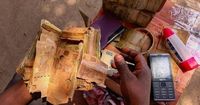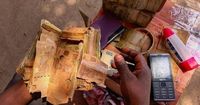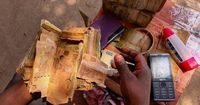In the bustling city of Bukavu, perched on the eastern edge of the Democratic Republic of Congo, daily life has been turned upside down by a crisis that’s as tangible as the money in people’s hands—or, more accurately, the lack of it. Since the Rwanda-backed M23 rebel group seized control of Bukavu in February 2025, the city’s 1.3 million residents have been forced into a desperate improvisation: using damaged, perforated banknotes that were supposed to be destroyed, but now serve as a last resort for survival.
Alain Mukumiro, a 36-year-old fridge technician and father of three, finds himself at the center of this crisis. In a small, wooden hut that doubles as a shop, Mukumiro pleads with a shopkeeper to accept his patched-up bills. “All my money has serial numbers, but they refuse it,” Mukumiro said, his frustration clear as he recounted his ordeal to The Associated Press. Like many in Bukavu, Mukumiro’s family faces yet another night without food—a grim reality that’s become all too common in the city since the rebels’ arrival.
The roots of this crisis stretch back to the dramatic events of February, when the M23’s advance forced Congolese authorities to shutter Bukavu’s banks. The closure, meant to prevent further instability, instead left the city’s residents without access to fresh cash. With no new banknotes arriving and the banks’ vaults sealed off, the only bills left circulating were old, hole-punched notes—perforated to mark them for destruction and somehow returned to the market. Many in Bukavu suspect these notes were stolen from bank buildings during the chaos of the takeover, though no one can say for sure.
“We keep these banknotes because we don’t know what else to do, it’s just to help each other out,” explained Ruboneka Mirindi Innocent, one of several locals who now work as black market money-changers. According to Innocent, the patched-up bills trade at a steep loss: it takes about ten of the damaged notes to buy what a single new bill would fetch. This lopsided exchange rate is just one more indignity for a population already battered by conflict and economic decline.
Bukavu was once a city humming with commerce. Now, the cash shortage has brought business to a near standstill. Shopkeepers and customers alike are caught in a web of confusion and mistrust. Some sellers will accept the battered notes, others won’t, and the resulting tension is palpable. “It’s a real headache because some sellers accept them and others don’t,” said Mukumiro. For many, the uncertainty is almost as painful as the hardship itself.
Zihalirwa Rutchababisha, who owns a repair equipment business, summed up the dilemma facing local merchants. “We are also facing the same situation as them,” he said, referring to his customers. “If I take them, I won’t be able to use them to purchase supplies and that would put me at a loss.” Rutchababisha’s profits have nosedived since the M23 took over; what was once a $120 weekly return has shrunk to just $20. The story is echoed across Bukavu, as economic activity withers under the twin pressures of conflict and a dysfunctional currency system.
The broader humanitarian picture is even bleaker. The fighting that brought the M23 to power in Bukavu has contributed to what The Associated Press calls one of the world’s largest humanitarian crises, with around 7 million people displaced across eastern Congo. For most residents, there’s no safety net to fall back on. While a handful of state employees—just 2% of Bukavu’s population—now receive their pay through online transfers, the vast majority rely on cash. In the informal sector, where most people work, digital payments remain a distant dream.
Desperation has forced residents and local officials to seek creative solutions. Last week, Patrick Busu Bwasingwi Nshombo, the M23-appointed governor of South Kivu province, offered a glimmer of hope by inviting residents to exchange their perforated notes at a bank newly opened by the rebels. But the operation was quickly overwhelmed. So many people brought in their damaged bills that the bank’s agents couldn’t keep up, and Nshombo suspended the exchange after just a few days.
For many in Bukavu, the episode only deepened the sense of uncertainty. David Kyanga, a professor of economics at Bukavu’s Higher Institute of Commerce, believes there’s only one practical solution in the short term: “The only solution is for the M23-controlled cities to adopt the defective banknotes as valid means of payment in the absence of cash supplies from Congolese banking authorities.” Kyanga argues that the rebels could calm tensions by publicly declaring the hole-punched notes valid, but so far, no such move has materialized.
Meanwhile, the national government in Kinshasa remains adamant: there will be no resumption of banking services or delivery of new banknotes to rebel-held areas. “No bank can open its doors in a situation of insecurity like what is happening in areas occupied by the M23,” said Congo’s government spokesperson Patrick Muyaya at a press conference last week. He also raised concerns about the legal and financial implications of dealing with the M23, which is under U.S. Treasury sanctions. “We don’t know who will save us,” Mukumiro lamented. “The government in Kinshasa turns a blind eye, and the liberators also watch the situation without taking action.”
As the days drag on, Bukavu’s residents are left to navigate a surreal economy where money is both everywhere and nowhere—stacks of battered bills that can’t always buy bread. The city’s predicament is a stark reminder of how quickly the basic fabric of daily life can unravel in the face of conflict, and how ordinary people are forced to improvise when institutions fail.
For now, the future remains uncertain. With banks shuttered, the government unwilling to intervene, and rebel authorities unable to offer a lasting fix, Bukavu’s people are left clinging to whatever currency they can find—damaged or not. Their resilience in the face of hardship may be the city’s greatest asset, but even resilience has its limits.






